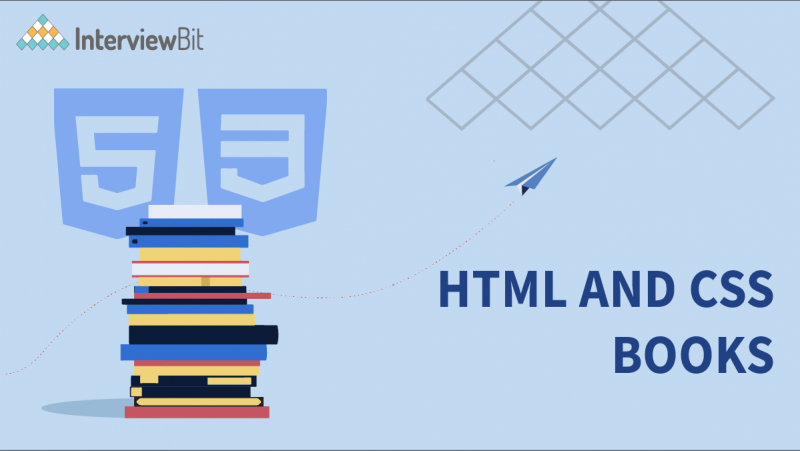- Best Books on HTML and CSS
- Best HTML/CSS Books For Beginners
- 1. Head First HTML and CSS
- 2. HTML and CSS Quickstart Guide
- 3. Get Coding!: Learn HTML, CSS & JavaScript & Build a Website, App & Game – by Young Rewired State
- Best HTML/CSS Books For Intermediates
- 4. Learning Web Design: A Beginner’s Guide to HTML, CSS, JavaScript, and Web Graphics
- 5. HTML and CSS: Design and Build Websites
- 6. HTML, CSS, and JavaScript All in One
- Best HTML/CSS Books For Experienced
- Conclusion
- FAQs
- Additional Resources
Front-End Web Developers or Web Designers are in high demand in the IT industry, and Front-End Developer Jobs pay well. All of these factors contribute to people’s desire to pursue this career path. Frontend development is all about UI/UX, with the layout, styling, and design of the website being the primary priority. Every web designer or frontend developer’s path begins with HTML and CSS, and once they have a firm grasp on both, they must move on to Javascript in order to incorporate interactive elements into their HTML and CSS designs.
All web pages are built on a foundation of HTML. The structure of a page is defined by HTML, while the style is defined by CSS. HTML and CSS are the foundations of everything you’ll need to create your first website!
Most people choose online videos or materials for learning frontend development, but books are sometimes the greatest alternative for reference or understanding the idea in depth from beginning to end.
Confused about your next job?
Through a compilation of book reviews, we’ve highlighted the top books for learning HTML and CSS in this blog. Each book review will focus on the book’s flavour, the topics discussed, and how it might help you.
While there is a wealth of knowledge about HTML/CSS coding available, selecting the finest HTML/CSS books and resources may seem difficult.
Most manuals and tutorials on the internet, for example, mix up their content in a way that makes it impossible to follow along from beginning to end. Then, if you move to YouTube videos, you’ll see that, while some of them provide useful illustrations, most of them are short and uninformative.
As a result, many coding beginners are forced to enrol in online HTML/CSS courses, whilst advanced coders choose to use HTML/CSS forums.
Below is the list of some best HTML and CSS Books. These books are not only beneficial for beginners but its also good for advanced learners. In the next section we will be discussing in detail about the books.
Best Books on HTML and CSS
Best HTML/CSS Books For Beginners
1. Head First HTML and CSS
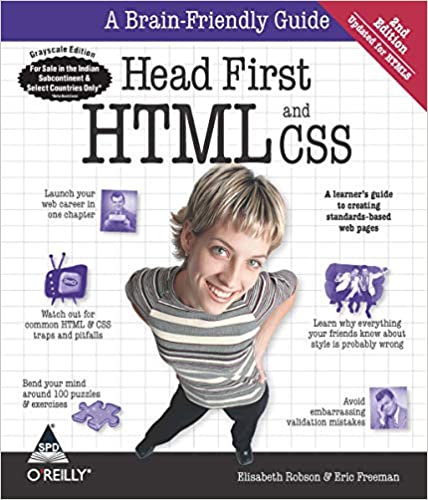
This book is given by Elizabeth Robson and Eric Freeman. Despite the fact that Head First HTML and CSS was published in 2012, it is still one of the best fundamental books for learning HTML and CSS. If you want to understand not just the “how,” but also the “why,” this book will help you lay a firm foundation that will last throughout your career.
This is a book for complete beginners. After you’ve gone over everything this book has to offer, you’ll want to brush up on the latest HTML principles that have emerged in the last decade. Of course, you’ll want to put in some practise time. Content of this book is:
- Creating HTML Page
- Designing and making web page
- FTP, HTTPs domain names usage
- Incorporating media in your web pages
- Styling Web Page
- Using the box model
- Advanced Web Construction, positioning and layouts
- Tables, List and form
Rating: 4.3/5 (Goodreads)
Latest Edition: 2e
2. HTML and CSS Quickstart Guide
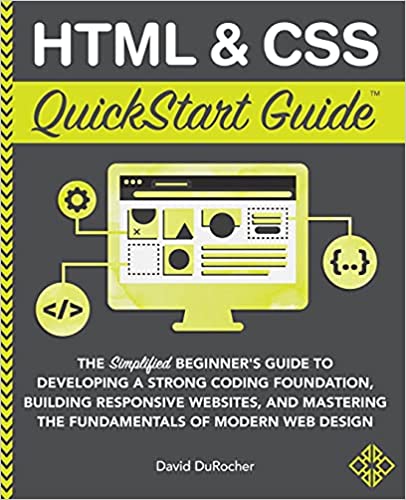
All of the key HTML and CSS fundamentals you need to know are covered in one place by David DuRocher. HTML tags, CSS elements, CSS styling, and how to put the pieces together are all covered in this book.
The author’s approach to teaching HTML and CSS principles is unique and fascinating. It progresses from high-level overviews of HTML and CSS to more detailed, hands-on advice on how to build websites. All concepts are backed up by a plethora of visual examples and hands-on activity! It’s an excellent resource for individuals learning to code and create websites.
This book is designed exclusively for beginners and is thorough, actionable, and simple to read. It’s an excellent resource for individuals learning to code and create websites.
This book speaks about : Modern Design Fundamentals, Site Structure and Responsive Design Principles, Breathing Life Into Your Projects, Correct Markup Best Practices, HTML and CSS For Beginners.
Ratings: 4.2/5 (Google Play)
Latest Edition: 3e
3. Get Coding!: Learn HTML, CSS & JavaScript & Build a Website, App & Game – by Young Rewired State
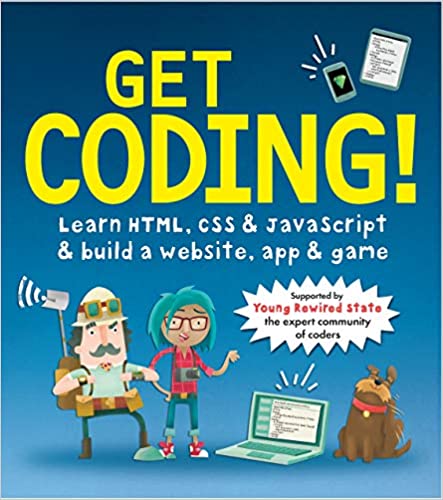
If you’re looking for the greatest HTML/CSS books for kids, here is a good place to start. Young Rewired State, a global tech community made up of teenagers and children, wrote the book. And, yes, it is aimed at the exact same demographic.
The good thing about this book is that it goes beyond HTML/CSS. Rather, it goes above and above by assisting children with JavaScript code. You’ll also notice that the text is easy enough for even eight-year-olds to grasp. The book takes them step by step through the three programming languages, before gradually on to the more difficult areas. Six engaging tasks are included in the book, each with straightforward step-by-step directions for learning the fundamentals of coding. Professor Bairstone, Dr. Day, and Ernest will need your aid to keep the Monk Diamond safe from a band of violent jewel thieves.
This book is a complete guide for kids who wish to start their programming skills in web development.
Rating: 4.1/5 (Goodreads)
Best HTML/CSS Books For Intermediates
4. Learning Web Design: A Beginner’s Guide to HTML, CSS, JavaScript, and Web Graphics
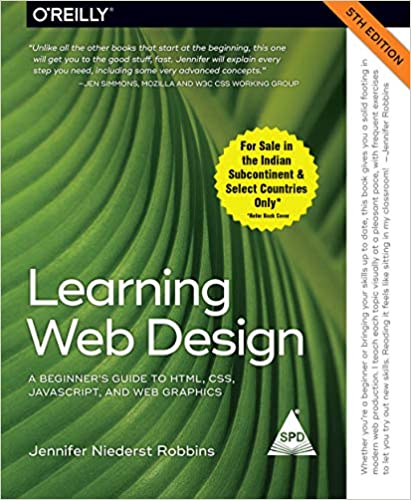
Jennifer Robbins’ Learning Web Design is a great place to start if you want to learn how to create websites. It’s a full-fledged introduction to web design and development. There are 25 chapters in the book, which are separated into five parts. Each chapter includes hands-on exercises and short quizzes to ensure that you comprehend essential concepts.
Latest Edition: 5e
Rating: 4.1/5 (Goodreads)
5. HTML and CSS: Design and Build Websites
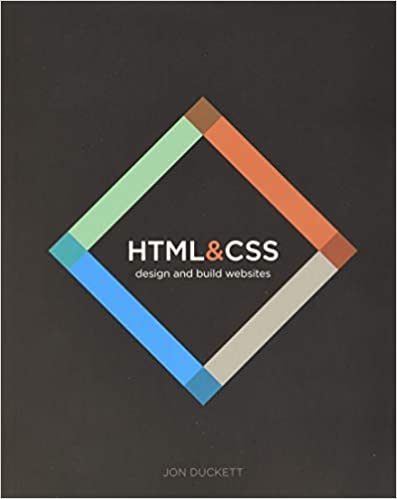
The Amazon bestseller Jon Duckett, a famous web designer and developer with over 15 years of expertise, is first on our list of the greatest HTML/CSS books.
He aims to make HTML/CSS less scary in this book by illustrating otherwise complex ideas with simple but colourful infographics and images. The layout is pleasingly basic, and you should be able to follow it from cover to cover with ease. In general, the book covers all of the fundamentals of HTML/CSS. You’ll learn how to create a website from the ground up, as well as how to work with languages on both Mac and PC and how to design various website features. Mr. Duckett has also given well-labeled screenshots of the text editor, demonstrating code samples.
Latest Edition: 3e
Rating: 4.3/5 (Goodreads)
6. HTML, CSS, and JavaScript All in One
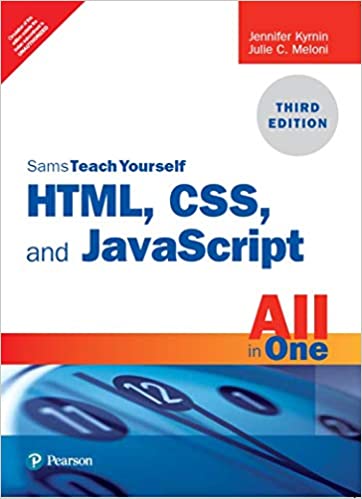
Meloni and Kyrin’s “HTML, CSS, and JavaScript All in One” is another complete resource for both beginners and advanced coders when it comes to HTML/CSS and JavaScript. You might think of it as a one-stop shop for learning the three most important web development languages. Essentially, the book explains how HTML, CSS, and JavaScript interact in modern web development before providing well-organized step-by-step examples on how to use all three technologies at the same time.
Each chapter includes perfectly integrated HTML5, CSS3, and ECMAScript 6 fundamentals. This tutorial will show you how to use them in a variety of web design situations.
Latest Edition: 3e
Ratings: 4.4/5 (Goodreads)
Best HTML/CSS Books For Experienced
7. Responsive Web Design with HTML5 and CSS by Ben Frain
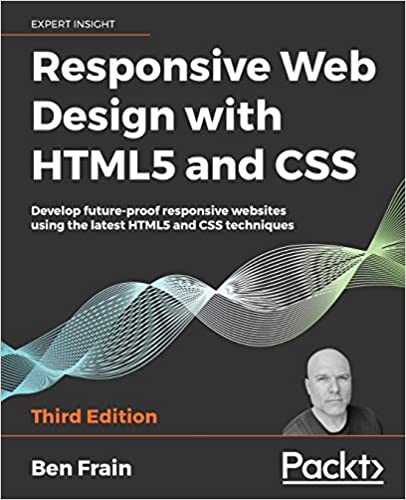
It teaches you how to use HTML5 and CSS to create a single user interface that works on mobile phones, tablets, and computers. The book is broken into eleven chapters and covers the following concepts
- Apply various styles to different devices by incorporating CSS media queries into your projects.
- Depending on the size or quality of your screen, load different groups of photos.
- Use accessible HTML patterns’ speed, semantics, and clean syntax to your advantage.
- Use SVGs in your designs to create pictures that aren’t affected by resolution.
- Use CSS’s most recent features, such as custom properties, changeable fonts, and CSS Grid.
- HTML forms should have validation and user interface components such as date and colour pickers.
- Learn how to use filters, shadows, animations, and other effects to improve interface elements.
Rating: 3.8/5 (Goodreads)
Latest Edition: 3e
8. HTML 5 Black Book (Covers CSS3, JavaScript, XML, XHTML, AJAX, PHP, jQuery)
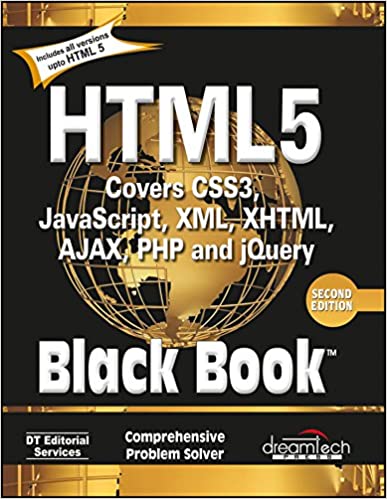
HTML5 Black Book by DT Editorial Services is a one-of-a-kind reference book written from the perspective of a Web expert, with hundreds of examples and coverage of practically every facet of HTML5. It will assist you in mastering a variety of Web technologies, including CSS3, JavaScript, XML, and AJAX, in addition to HTML5. This book will introduce you to the latest features and elements of HTML5, such as audio and video media elements, the canvas element for sketching, and many others, if you are a Web designer or developer. In this book, you’ll learn how to create Web apps using HTML5 and other Web technologies in the most recent versions of modern browsers.
Ratings: 4.1/5 (Goodreads)
Latest Edition: 2e
9. HTML5 and CSS3 All-in-One For Dummies – by Andy Harris
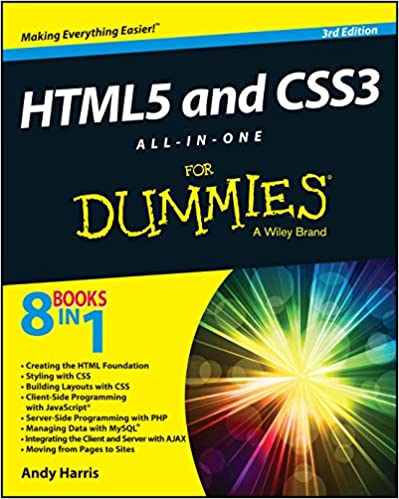
This all-in-one handbook “for dummies” is one of the best HTML/CSS publications, as it covers almost all of the HML5 and CSS3 fundamentals.In essence, this is where you’ll discover notes on the most recent HTML/CSS versions that are beginner-friendly. Andy Harris walks you through the fundamentals of working with HTML5 and CSS3, then shows you how to combine them with Ajax, MySQL, and JavaScript to create genuinely usable websites. In simple terms, you can anticipate to be covered comprehensively not just in terms of basic design and layout, but also in terms of client-side elements and server-side components. This appears to be an excellent book for both new and experienced coders.
Ratings: 4.2/5 (Goodreads)
Latest Edition: 3e
10. CSS Pocket Reference
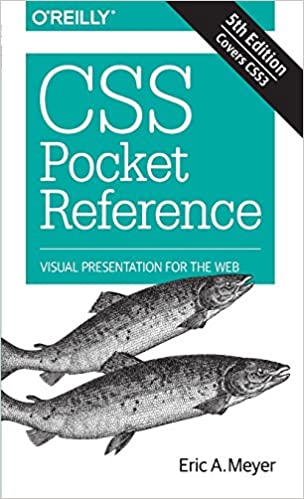
Visual Presentation for the Web- This simple yet comprehensive quick reference by Eric A. Meyer delivers the vital knowledge you need when dealing with CSS and needs an answer right away. This fifth version has been revised and updated for CSS3, making it suited for intermediate to advanced web designers and developers. You’ll find an alphabetical summary of CSS selectors and properties, as well as a brief introduction to CSS’s fundamental ideas. Grid, flexbox, clipping, masking, and compositing are just a few of the new characteristics you’ll learn about. Find the information you require quickly. CSS concepts, values, selectors and queries, and properties are all explored. Learn how new features can help you improve and extend your CSS skills. In this updated edition, you’ll learn about new characteristics like animations, grids, flexboxes, masking, filtering, and compositing.
Ratings: 4/5 (Goodreads)
Latest Edition: 5e
Conclusion
So, you’ve come across some wonderful books that are essential for any Frontend Developer or aspiring frontend developers. Keep in mind that most of these books are available in several versions while you’re at it. So, before you go any further, double-check that you’re getting the most recent version. Have a happy learning.
FAQs
Is HTML good in 2022?
Yes, HTML is still useful in 2022 because it is the core mark-up language for building web architecture.
What profession uses HTML?
Frontend developers are in charge of the entire website’s end-to-end code. They manage HTML projects, create online apps, code websites, and assist website visitors.
Can I get a job if I know HTML?
You can certainly find a job if you only know HTML and CSS. And even if those core abilities aren’t enough to land you your dream job, you can utilize them to start earning money while you learn more.
Additional Resources
- Best HTML IDE
- HTML Projects
- HTML MCQ
- Difference Between HTML and JavaScript
- HTML5 Features
- Top Features of HTML
- Difference Between HTML and XML
- Difference Between HTML and CSS
- Difference Between HTML and XHTML
- Difference Between HTML and HTML5
- Difference Between CSS and CSS3
- Types of CSS
- CSS Interview Questions
- CSS MCQ







 Join WhatsApp Group
Join WhatsApp Group
